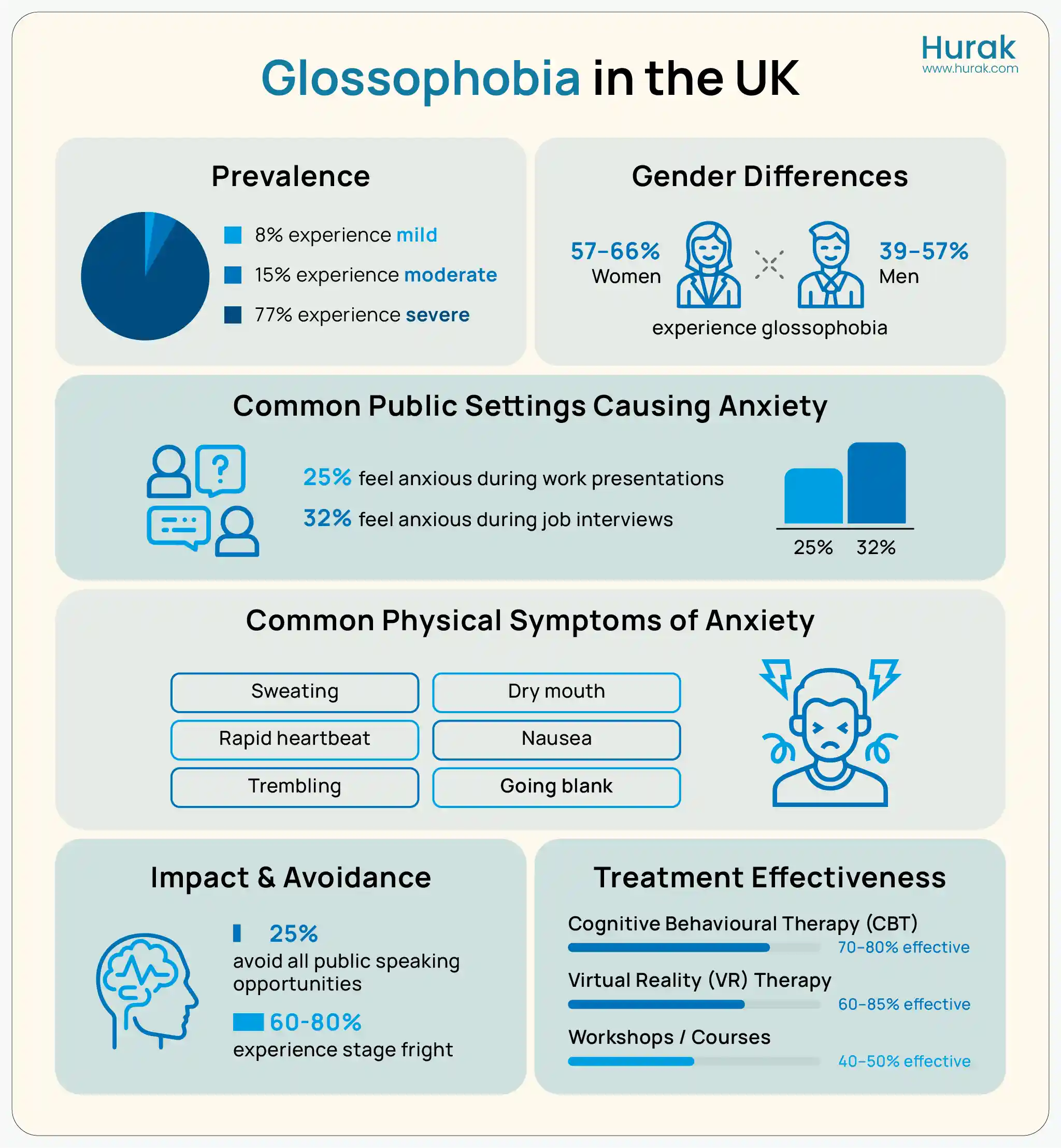The fear of public speaking, or glossophobia, is one of the most common anxieties people face today. Research indicates that up to 75% of people experience some form of public speaking anxiety, and for many, it can be debilitating. But what exactly causes this intense reaction, and how can you fight back against it?
In this guide, we’ll break down the roots of this fear, its common symptoms, and practical treatments to help you become a more confident and effective speaker.
What is Glossophobia?
Glossophobia, or public speaking anxiety, is the intense fear of public speaking. It’s not just a case of getting a little nervous before speaking; it’s a social phobia that can cause debilitating physical symptoms like a racing heart and trembling, and it’s a common cause of speech problems. This intense fear of public speaking can significantly impact one’s personal and professional life.
With the right strategies and support, it’s a fear that can be managed and overcome. There are effective techniques and glossophobia treatment options available to help you handle the common speech anxiety symptoms. By learning how to overcome fear of public speaking, you can build the confidence to communicate your ideas effectively and with clarity.
To understand just how widespread this fear is, let’s look at some key statistics on glossophobia in the UK.

What triggers Glossophobia?
Glossophobia often develops from a combination of psychological, social, and biological factors. Here are some of the most common triggers:
- Fear of Judgment: Many people dread the idea of being judged or embarrassed in front of others. You might constantly worry about making mistakes, forgetting what you planned to say, or appearing nervous. This anticipation of negative evaluation often leads to overwhelming anxiety before you even start speaking.
- Past Negative Experiences:If you’ve had unpleasant experiences, like being laughed at, criticised harshly, or feeling humiliated during a presentation, they can leave a lasting impact. These memories create a mental association between public speaking and emotional pain, reinforcing the belief that it’s something to be feared.
- Perfectionism and High Expectations: Perfectionism can be a major trigger. People who hold themselves to extremely high standards often feel that anything short of a flawless performance is a failure. This intense pressure creates self-doubt and makes it much harder to approach public speaking with confidence.
- Lack of Experience or Preparation: Inexperience with public speaking can make the situation feel threatening simply because it’s unfamiliar. Even seasoned speakers may feel anxious if they haven’t prepared thoroughly or if the topic feels outside their comfort zone.
- Biological Stress Response: When you perceive public speaking as a threat, your body activates its “fight or flight” response. This surge of adrenaline can cause a rapid heartbeat, shaky hands, sweaty palms, dry mouth, and difficulty concentrating, symptoms that make it even harder to speak clearly.
- Underlying Social Anxiety: Glossophobia is sometimes part of a broader social anxiety disorder. People with social anxiety often experience an intense fear of being scrutinized or negatively evaluated in any social or performance situation, not just public speaking.
What causes Glossophobia?
Understanding what causes glossophobia is an important step toward overcoming it. While many people think the fear of public speaking simply comes from being shy, it’s usually influenced by a combination of factors. These can include your personality, past experiences, biological responses, and the environment you grew up in.
Below, you’ll find a detailed look at the most common causes of glossophobia and how each one can contribute to the anxiety you feel when speaking in front of others.
Cause | Description |
Genetic and Biological Factors | A natural tendency toward anxiety can run in families. Your body’s stress response may be stronger, causing intense physical symptoms when you speak in public. |
Personality Traits | Being shy, introverted, or self-conscious makes you more likely to fear being the centre of attention or being judged by others. |
Negative Past Experiences | Traumatic events, such as forgetting your words or being criticised, can create lasting memories that trigger anxiety in future speaking situations. |
Lack of Public Speaking Skills | Limited experience or training in organising and delivering a presentation increases the fear of making mistakes or losing your audience’s attention. |
High Stakes and Pressure | When the situation feels important, like giving a work presentation or speaking at a wedding, the pressure to perform well can heighten anxiety and fear of failure. |
Social and Cultural Influences | Growing up in an environment where mistakes were criticised or where speaking up wasn’t encouraged can lead to self-doubt and fear of public speaking later in life. |
Underlying Social Anxiety | For some, glossophobia is part of a broader social anxiety disorder, causing fear in many social situations, not just public speaking. |
What are the symptoms of Glossophobia?
Glossophobia affects both the mind and body. For some, symptoms start days or even weeks before a planned speech. For others, they appear suddenly right before or during the presentation.
Here are some of the most common symptoms of glossophobia:
Physical Symptoms
- Rapid Heartbeat: Your heart may race as adrenaline floods your body.
- Shaking or Trembling: Your hands, voice, or entire body might shake uncontrollably.
- Sweating: Excessive perspiration, especially on your palms or forehead.
- Dry Mouth and Throat: Making it hard to speak clearly or swallow.
- Nausea or Upset Stomach: Some people feel sick or lightheaded.
- Shortness of Breath: You might feel like you can’t catch your breath or that your chest is tight.
- Muscle Tension: Especially in the neck, shoulders, or jaw.
Psychological Symptoms
- Intense Anxiety or Panic: Overwhelming worry or dread before and during speaking.
- Blanking Out: Forgetting what you planned to say, even if you practised.
- Feeling Detached: Some describe feeling like they’re watching themselves from outside their body.
- Fear of Judgment: A strong belief that others are criticizing or laughing at you.
Behavioural Symptoms
- Avoidance: Going out of your way to avoid situations where you might have to speak publicly.
- Rushing Through: Speaking too quickly to finish as fast as possible.
- Over-Preparation: Spending excessive time rehearsing out of fear of making mistakes.
You can always be a step ahead in spreading awareness of phobias like Glossophobia.
Hurak’s Mental Health First Aid Courses will help you take the first step in knowing and understanding mental health better.
Join our Mental Health First Aid Course today.
How to deal with Glossophobia?
While glossophobia can feel overwhelming, it is treatable. Many people successfully learn to manage their public speaking anxiety and build confidence over time. Here are some proven ways to deal with glossophobia:
Practice Gradual Exposure
Start small and work your way up. Practising in low-pressure situations can help desensitize your fear over time.
- Rehearse in front of a mirror or record yourself.
- Practice with a supportive friend or family member.
- Gradually increase the size of your audience.
Learn Relaxation Techniques
Relaxation exercises can calm your body’s stress response before and during speaking:
- Deep Breathing: Inhale slowly through your nose, hold for a few seconds, and exhale slowly through your mouth.
- Progressive Muscle Relaxation: Tense and release each muscle group to reduce tension.
- Mindfulness: Focus on the present moment instead of worrying about what might go wrong.
Reshape Negative Thoughts
Cognitive restructuring helps you challenge unhelpful beliefs:
- Notice when you’re thinking, “I will embarrass myself” or “Everyone will judge me.”
- Replace these with realistic thoughts like, “It’s okay to be nervous, most people won’t even notice.”
- Remind yourself that making mistakes is normal and doesn’t define your abilities.
Prepare Thoroughly
Preparation increases confidence:
- Organize your key points clearly.
- Use notes or slides to guide you if needed.
- Practice out loud multiple times.
- Time yourself so you feel in control.
Work with a Therapist
Professional help can be very effective, especially if your fear feels unmanageable. Treatment options include:
- Cognitive Behavioural Therapy (CBT): A structured approach to change negative thinking patterns and build coping skills.
- Exposure Therapy: Gradual, guided practice in safe environments.
- Medication: In some cases, short-term medications like beta-blockers can help manage physical symptoms.
Consider Public Speaking Courses
Joining a course or workshop can help you:
Learn techniques for engaging an audience.
Practice in a supportive setting.
Receive constructive feedback.
Connect with others facing the same fears
Focus on Progress, Not Perfection
Remember, it’s normal to feel nervous. The goal isn’t to eliminate all anxiety but to speak confidently despite it. Celebrate every step forward, no matter how small.
Conclusion
Glossophobia is one of the most common fears in the world, but it doesn’t have to hold you back. Whether your anxiety stems from past experiences, personality traits, or simply a lack of practice, there are effective strategies and treatments available to help you move past the fear of public speaking.
If you’re struggling, don’t hesitate to reach out for professional help or join a supportive public speaking group. With the right approach and support, you can transform public speaking from something you dread into an opportunity to share your voice and connect with others.
FAQs
What is glossophobia, and how common is it?
Glossophobia is the fear of public speaking, often triggered by anxiety about being judged or making mistakes in front of an audience. It’s one of the most common phobias, affecting up to 75% of people to some degree.
Can anxiety cause speech problems like glossophobia?
Yes, anxiety can lead to speech problems such as stuttering, a shaky voice, dry mouth, or even forgetting what to say. These symptoms are common in people with glossophobia or public speaking anxiety.
What are the symptoms of public speaking anxiety?
Symptoms include a racing heart, trembling, sweating, dry mouth, nausea, mental blocks, and intense fear before or during speaking. These physical and emotional responses can vary in intensity.
How can I overcome my fear of public speaking?
You can overcome glossophobia by practicing in low-pressure settings, using relaxation techniques, challenging negative thoughts, and seeking help through therapy or public speaking courses.
What treatments are available for glossophobia?
Effective treatments include Cognitive Behavioral Therapy (CBT), exposure therapy, breathing techniques, and in some cases, medication. Many people also benefit from joining public speaking workshops or support groups
Explore Our First Aid Courses:
Emergency First Aid at Work: A short, hands-on course designed for low-risk workplaces. This practical training gives participants the essential skills and confidence to respond effectively to medical emergencies.
First Aid at Work: A comprehensive, Ofqual-regulated Level 3 qualification delivered over three days in a classroom setting. Ideal for designated first-aiders working in higher-risk environments such as construction sites, warehouses, and manufacturing facilities.
Paediatric First Aid: An Ofqual-regulated, two-day course focused on caring for infants (0–1 year) and children up to puberty. Perfect for childcare professionals, teachers, and parents who want the skills and confidence to handle emergencies involving young children.
Basic First Aid Course: A flexible, self-paced introductory program for anyone seeking foundational first aid knowledge or a convenient annual refresher to maintain vital lifesaving skills.
Advanced First Aid Course: A fully online, in-depth Level 3 qualification for those ready to expand their expertise beyond basic first aid. Ideal for individuals looking to develop advanced assessment and emergency response capabilities





